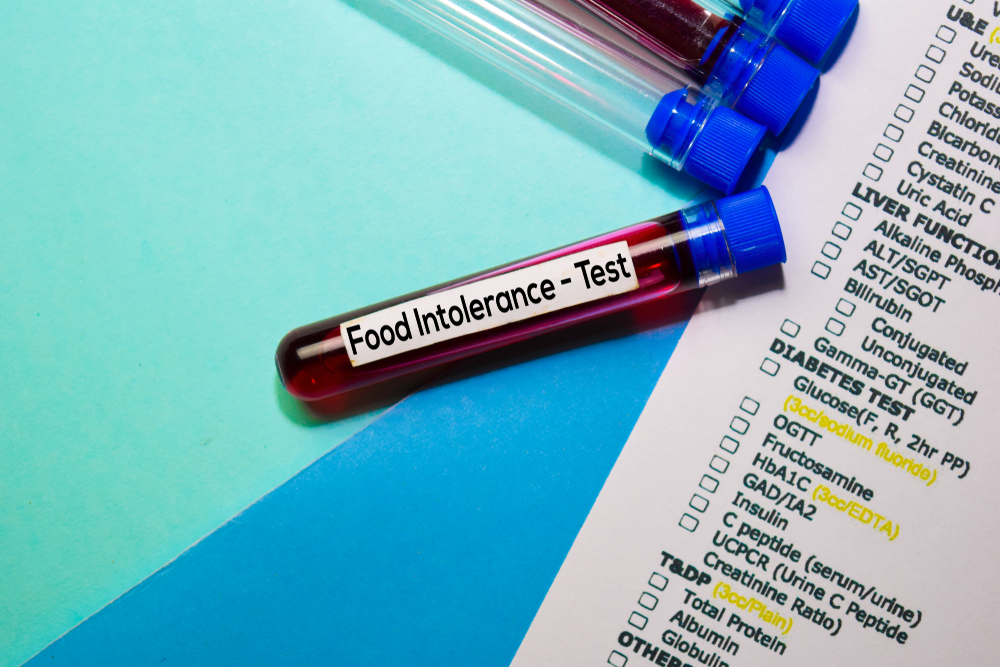York Test Review – Is it accurate for food intolerance testing?
- Treatments, Testing and Diagnosis
In this post, we will be writing a review of the York Test, ultimately, whether you should spend your hard-earned cash on this or not.
Have you noticed having digestive symptoms recently? Or perhaps you have tried to get an appointment with your GP for help with no success.
Digestive symptoms like bloating, diarrhoea, and abdominal pain can reduce your quality of life and can often lead to you heading to the internet in search of ways to get a quick answer.
So it comes as no surprise that you may think that a food intolerance could be causing your issues. And what better way to get a diagnosis? Surely, a test would be the way forward.
In this blog post, however, we will focus on one test, the YorkTest, in particular. The YorkTest company produces a “Premium Food Intolerance Test” to test for food and drink intolerances.
We will explore the test kit, what it tests for, whether it works, and whether this is the best way to test for food intolerances.

What is the YorkTest?
The YorkTest company is a UK-based company that provides a range of home-to-laboratory food intolerance tests, allergy tests, and health tests.
The company states that its tests are designed “to empower you to better understand, take control of, and optimize your health and wellbeing” [1].
While the company sells a variety of tests, we will look specifically at the “Premium Intolerance Test”.
About the Premium Intolerance Test
The YorkTest’s Premium Intolerance Test claims to be a comprehensive food and drink intolerance test to determine whether you are intolerant to 200 food and drink ingredients.
The test is currently marketed at £199 and involves a finger-prick blood sample sent back in the post, with results in 7 days [2].
The company states they measure four subtypes of food-specific IgG (1-4) antibodies to ensure that all different food-specific IgG reactions are detected.
All the foods that they test for are listed on their website in detail but range from milk, eggs, meats, fruit, vegetables, and grains [2].
What are IgG antibodies?
Antibodies are proteins that your immune cells make to fight off bacteria, viruses, and other harmful invaders to your body [3].
There are four types of antibodies, but the ones you often hear about in food allergies and intolerances are IgE and IgG.
IgE antibodies are produced when your body overreacts to substances that aren’t harmful. It is often a fast reaction and is therefore used to test for those with a food allergy.
IgG antibodies are the most common type of antibody in your blood and usually protect you against infection by “remembering” harmful substances you’ve previously been exposed to.
Researchers have theorized that IgG antibodies are elevated with food intolerances, as IgG antibodies characteristically have a delayed response to exposure to harmful substances [4].
In food intolerance, the delayed response from the IgG antibodies causes the gut symptoms felt upon eating food that your body may deem harmful.
Does the York Food Intolerance test work?
There is no research to prove that IgG antibody testing, which is what the York test looks at, is an accurate way to diagnose food intolerances.
In fact, there seems to be no proven relationship between IgG antibodies and food intolerances at all.
Allergy UK did commission a research study on the testing to try and identify if this was accurate or not [6].
However, looking at their findings, 15% of the participants had a psychological problem. For these people, an anxious brain can send signals to the gut, causing intestinal distress [7].
Reduced anxiety when eating food if you truly believe you have an accurate food intolerance diagnosis can reduce digestive problems.
In order to assess whether the YorkTest is an accurate way to diagnose a food intolerance, an independent randomized controlled trial would need to be carried out.
Unsurprisingly, The British Dietetic Association also confirms that no convincing evidence supports this test, and it is not recommended as a diagnostic tool for food intolerances [8].
What is the best way to test for food intolerance?
Sadly, there is currently no known accurate food intolerance ‘test’ available.
The only way to accurately diagnose your food intolerance is to remove that food or foods from your diet for a period of time.
If symptoms resolve but return on reintroduction you can diagnose a food intolerance.
Please note that you will also need to have a number of other medical routine tests through your doctor to rule out other conditions such as celiac disease.
Summary
The York Test claims to diagnose food intolerances but the claims are not based on any scientific basis at all.
Professional health bodies such as The British Dietetic Association advise to avoid such testing.
As we have seen, there are multiple explanations about why someone may improve their symptoms following the test, but no plausible way that it actually diagnoses an intolerance.
As registered dietitians we would not advise this test due to the lack of proven accuracy but also the risk of a restricted diet which can lead to malnutrition and potentially eating disorders.
Written by Stella Gordon, Dietitian reviewed by Kirsten Jackson Consultant Dietitian